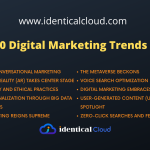
Top 10 Courses to Enhance Your Technical Skills
Top 10 Courses to Enhance Your Technical Skills
In today’s fast-paced world, keeping up with technological advancements and enhancing your technical skills is crucial for personal and professional growth. The rapidly changing landscape of industries demands that individuals continuously upgrade their skills to remain competitive and adaptable. Whether you’re looking to boost your career prospects, pivot to a new field, or simply expand your knowledge horizons, enrolling in the right courses can provide you with the tools you need.
In this blog, we’ll delve into ten outstanding courses that can help you enhance your technical expertise and stay ahead in your chosen field.
1. Data Science and Machine Learning:
- Course: “Data Science Specialization” on Coursera by Johns Hopkins University.
- Why: This comprehensive program covers data analysis, machine learning algorithms, statistical concepts, and data visualization techniques. It equips you with the skills to extract valuable insights from complex datasets and make data-driven decisions.
Here are some of the benefits of learning data science and machine learning:
- High demand: Data scientists and machine learning engineers are in high demand and can command high salaries.
- Variety of applications: Data science and machine learning can be applied to a wide variety of industries, so there are many opportunities for employment.
- Challenging and rewarding: Data science and machine learning are challenging fields, but they are also very rewarding.
- Future-proof: Data science and machine learning are rapidly growing fields, so the skills you learn will be in demand for many years to come.
2. Web Development:
- Course: “The Web Developer Bootcamp” on Udemy by Colt Steele.
- Why: This course offers a complete guide to modern web development. You’ll learn HTML, CSS, JavaScript, and essential front-end and back-end technologies, enabling you to build responsive, interactive, and visually appealing websites.
Here are some of the benefits of learning web development:
- High demand: Web developers are in high demand and can command high salaries.
- Variety of applications: Web development skills can be applied to a wide variety of industries, so there are many opportunities for employment.
- Challenging and rewarding: Web development is a challenging field, but it is also very rewarding.
- Future-proof: Web development is a rapidly growing field, so the skills you learn will be in demand for many years to come.
3. Cloud Computing:
- Course: “AWS Certified Solutions Architect – Associate” on Udemy by Ryan Kroonenburg.
- Why: Cloud computing is revolutionizing IT infrastructure. This course prepares you for the AWS Certified Solutions Architect exam, teaching you how to design and deploy scalable, reliable, and cost-effective cloud solutions.
Cloud computing offers many benefits, including:
- Cost savings: Cloud computing can help businesses and organizations save money on IT costs. They don’t need to buy, own, and maintain physical servers and other IT infrastructure.
- Flexibility: Cloud computing is scalable, so businesses and organizations can easily add or remove resources as needed. This makes it a good choice for businesses with fluctuating workloads.
- Reliability: Cloud providers offer high availability and uptime guarantees. This means that businesses and organizations can be confident that their applications and data will be available when they need them.
- Security: Cloud providers offer a variety of security features to protect businesses and organizations’ applications and data.
4. Artificial Intelligence:
- Course: “Artificial Intelligence A-Z™: Learn How To Build An AI” on Udemy by Kirill Eremenko.
- Why: AI is reshaping industries across the globe. This course provides hands-on experience in building AI models, including machine learning and neural networks, empowering you to create intelligent systems.
Here are some of the benefits of artificial intelligence (AI):
- Improved decision-making: AI can help businesses and organizations make better decisions by analyzing data and identifying patterns.
- Automated tasks: AI can automate tasks, freeing up human workers to focus on more creative and strategic work.
- Personalized experiences: AI can be used to personalize experiences for customers and users, making them more relevant and engaging.
- Increased productivity: AI can help businesses and organizations improve their productivity by automating tasks and making better decisions.
- Reduced costs: AI can help businesses and organizations reduce their costs by automating tasks and making better decisions.
- Improved safety: AI can be used to improve safety by detecting hazards and preventing accidents.
- New products and services: AI can be used to develop new products and services that meet the needs of customers and users.
- Disease diagnosis: AI can be used to diagnose diseases more accurately and efficiently than humans.
- Treatment planning: AI can be used to plan treatments for diseases more effectively.
- Drug discovery: AI can be used to discover new drugs more quickly and efficiently.
- Personalized medicine: AI can be used to personalize medicine for each patient, making it more effective and efficient.
- Environmental protection: AI can be used to protect the environment by monitoring pollution and developing sustainable solutions.
5. Cybersecurity:
- Course: “Certified Information Systems Security Professional (CISSP)” on Cybrary.
- Why: With the increasing frequency of cyber threats, organizations need cybersecurity experts. This course covers essential security concepts, risk management, and techniques to safeguard digital assets.
Here are some of the benefits of cybersecurity:
- Protects businesses and organizations from financial losses: Cyberattacks can result in significant financial losses for businesses and organizations. Cybersecurity can help to protect businesses and organizations from these losses by preventing cyberattacks or minimizing the damage caused by cyberattacks.
- Protects sensitive data: Cybersecurity can help to protect sensitive data, such as customer data, financial data, and intellectual property. This data can be used by criminals to commit fraud, identity theft, and other crimes.
- Protects national security: Cybersecurity is also important for national security. Cyberattacks can be used to disrupt critical infrastructure, such as power grids and telecommunications networks. Cybersecurity can help to protect critical infrastructure from these attacks.
- Protects individuals’ privacy: Cybersecurity can help to protect individuals’ privacy by preventing the unauthorized access to or disclosure of personal information. This information can be used by criminals to commit identity theft and other crimes.
- Creates a more secure and trusted online environment: Cybersecurity can help to create a more secure and trusted online environment for businesses, organizations, and individuals. This can lead to increased economic activity and innovation.
Cybersecurity is a critical issue in today’s world. As more and more of our lives are conducted online, we are increasingly vulnerable to cyberattacks. Businesses, governments, and individuals all need to take steps to protect themselves from cyberattacks.
6. Mobile App Development:
- Course: “The Complete iOS App Development Bootcamp” on Udemy by Angela Yu.
- Why: Mobile apps are a fundamental part of modern life. This course teaches you Swift programming and how to build iOS apps from scratch using Xcode.
Here are some of the benefits of mobile app development:
- Reach a wider audience: Mobile apps can be accessed by people all over the world, regardless of their location or device. This makes them a great way to reach a wider audience than traditional marketing methods.
- Increase customer engagement: Mobile apps can be used to keep customers engaged with your brand. They can provide updates on new products or services, offer exclusive deals and discounts, and allow customers to interact with your brand in new ways.
- Collect data: Mobile apps can be used to collect data about your customers, such as their usage habits, demographics, and interests. This data can be used to improve your products and services, target your marketing campaigns, and make better business decisions.
- Improve customer service: Mobile apps can be used to provide customer service 24/7. This can be done through features such as live chat, chatbots, and knowledge bases.
- Increase brand awareness: Mobile apps can be used to increase brand awareness by putting your brand in front of potential customers on a daily basis.
- Generate revenue: Mobile apps can be used to generate revenue through a variety of methods, such as in-app advertising, in-app purchases, and subscription fees.
- Differentiate yourself from the competition: Mobile apps can be a great way to differentiate yourself from the competition. By offering a unique and innovative mobile app, you can attract new customers and keep your existing customers engaged.
7. DevOps:
- Course: “Docker Mastery: The Complete Toolset From a Docker Captain” on Udemy by Bret Fisher.
- Why: DevOps practices streamline software development and deployment. This course focuses on Docker and containerization, enhancing your ability to create scalable and consistent environments.
Here are some of the benefits of DevOps:
- Increased speed and agility: DevOps can help organizations to release new products and features faster and more frequently. This is because DevOps breaks down the silos between development, operations, and security teams, and allows them to work together more closely.
- Improved quality: DevOps can help organizations to improve the quality of their products and services. This is because DevOps emphasizes continuous testing and feedback, which helps to identify and fix defects early in the development process.
- Reduced costs: DevOps can help organizations to reduce costs. This is because DevOps can help to shorten the development lifecycle, which can lead to lower development costs.
- Improved security: DevOps can help organizations to improve the security of their products and services. This is because DevOps emphasizes continuous monitoring and security testing, which helps to identify and fix security vulnerabilities early.
- Increased collaboration: DevOps can help organizations to improve collaboration between development, operations, and security teams. This is because DevOps breaks down the silos between these teams and allows them to work together more closely.
- Improved communication: DevOps can help organizations to improve communication between development, operations, and security teams. This is because DevOps emphasizes the importance of clear and concise communication.
- Improved visibility: DevOps can help organizations to improve visibility into their development, operations, and security processes. This is because DevOps tools and practices can help to collect and analyze data about these processes.
DevOps is a relatively new approach to software development, but it has quickly gained popularity due to its many benefits. If you are looking for ways to improve the speed, agility, quality, security, and collaboration of your software development process, then DevOps is a good option to consider.
8. Big Data and Analytics:
- Course: “Big Data Specialization” on Coursera by University of California, San Diego.
- Why: As data continues to grow, the ability to analyze it becomes invaluable. This specialization covers big data processing, analysis, and visualization techniques using tools like Hadoop and Spark.
Here are some of the benefits of big data and analytics:
- Improved decision-making: Big data analytics can help businesses to make better decisions by providing them with insights into their customers, operations, and markets. This can lead to increased sales, improved efficiency, and reduced costs.
- Increased customer satisfaction: Big data analytics can help businesses to better understand their customers’ needs and preferences. This can lead to the development of products and services that meet those needs, which can in turn lead to increased customer satisfaction.
- Reduced risk: Big data analytics can help businesses to identify and mitigate risks. This can be done by analyzing data to identify patterns and trends that may indicate potential problems.
- Increased innovation: Big data analytics can help businesses to identify new opportunities for innovation. This can be done by analyzing data to identify new trends and insights.
- Improved compliance: Big data analytics can help businesses to comply with regulations. This can be done by analyzing data to identify potential risks and areas where compliance may be lacking.
- Improved security: Big data analytics can help businesses to improve their security posture. This can be done by analyzing data to identify potential threats and vulnerabilities.
- Increased operational efficiency: Big data analytics can help businesses to improve their operational efficiency. This can be done by analyzing data to identify areas where processes can be improved or streamlined.
- Increased competitive advantage: Big data analytics can help businesses to gain a competitive advantage by providing them with insights that their competitors may not have. This can lead to increased sales, market share, and profitability.
Big data and analytics are rapidly evolving fields, and the benefits that they can offer businesses are only going to increase in the years to come. If you are looking for ways to improve your business, then big data and analytics are a good place to start.
9. UX/UI Design:
- Course: “User Experience Design Essentials – Adobe XD UI UX Design” on Udemy by Daniel Walter Scott.
- Why: User experience (UX) and user interface (UI) design are essential for creating user-friendly digital products. This course helps you master design principles, wireframing, and prototyping.
Here are some of the benefits of UX/UI design:
- Increased user satisfaction: Good UX/UI design can make a product or service more user-friendly and enjoyable to use. This can lead to increased user satisfaction and loyalty.
- Improved conversion rates: Good UX/UI design can help to improve conversion rates by making it easier for users to find what they are looking for and complete desired actions.
- Reduced costs: Good UX/UI design can help to reduce costs by making it easier for users to use a product or service, which can lead to fewer support tickets and calls.
- Increased sales: Good UX/UI design can help to increase sales by making it easier for users to find and purchase products or services.
- Enhanced brand image: Good UX/UI design can help to enhance a brand image by making it look more professional and polished.
- Improved accessibility: Good UX/UI design can help to improve accessibility for users with disabilities by making it easier for them to use a product or service.
- Increased engagement: Good UX/UI design can help to increase engagement by making it more enjoyable for users to interact with a product or service.
- Improved retention: Good UX/UI design can help to improve retention by making it more likely for users to continue using a product or service.
UX/UI design is a complex and ever-evolving field, but it is essential for creating products and services that are user-friendly and enjoyable to use.
10. Blockchain Technology:
- Course: “Blockchain Basics” on edX by Linux Foundation.
- Why: Blockchain’s potential goes beyond cryptocurrencies. This course introduces you to the fundamentals of blockchain technology and its applications in various industries, from finance to supply chain management.
Here are some of the benefits of blockchain technology:
- Security: Blockchain is a secure technology that uses cryptography to secure data. This makes it difficult for unauthorized users to access or modify data.
- Transparency: Blockchain is a transparent technology that allows anyone to view the data that is stored on the blockchain. This makes it difficult for fraud or corruption to occur.
- Immutability: Blockchain is an immutable technology that means that data cannot be changed once it is added to the blockchain. This makes it a reliable way to store data.
- Cost-efficiency: Blockchain can be a cost-effective way to store and manage data. This is because blockchain eliminates the need for intermediaries, such as banks or governments.
- Scalability: Blockchain is a scalable technology that can be used to store and manage large amounts of data. This makes it a good option for applications that require a lot of data storage, such as supply chain management and financial transactions.
- Disintermediation: Blockchain can help to disintermediate intermediaries, such as banks or governments. This can save businesses and individuals money and make transactions more efficient.
- Automated transactions: Blockchain can be used to automate transactions. This can save businesses and individuals time and money.
- Smart contracts: Blockchain can be used to create smart contracts. These are self-executing contracts that do not require third-party enforcement.
- Traceability: Blockchain can be used to track the history of transactions. This can be useful for auditing purposes and for ensuring that products are not counterfeited.
Blockchain is a rapidly evolving technology, and the benefits that it can offer are only going to increase in the years to come.
Embracing continuous learning is vital in a world driven by technology. These ten courses offer a diverse range of technical skills that cater to various industries and interests. Whether you’re a seasoned professional or just starting on your learning journey, investing in these courses can provide you with the knowledge and expertise you need to excel. As you explore these opportunities, remember that enhancing your technical skills is an investment in your personal growth, career advancement, and adaptability in the ever-changing landscape of technology.






